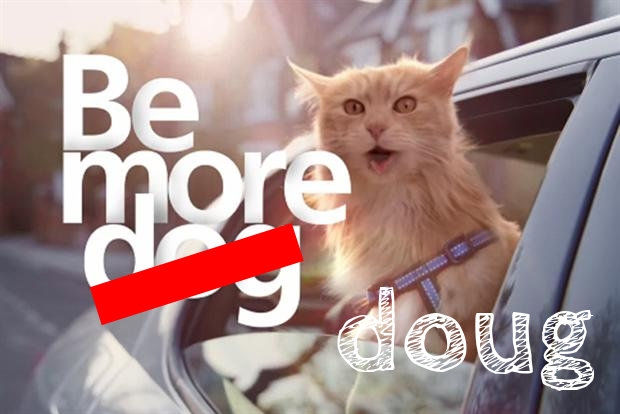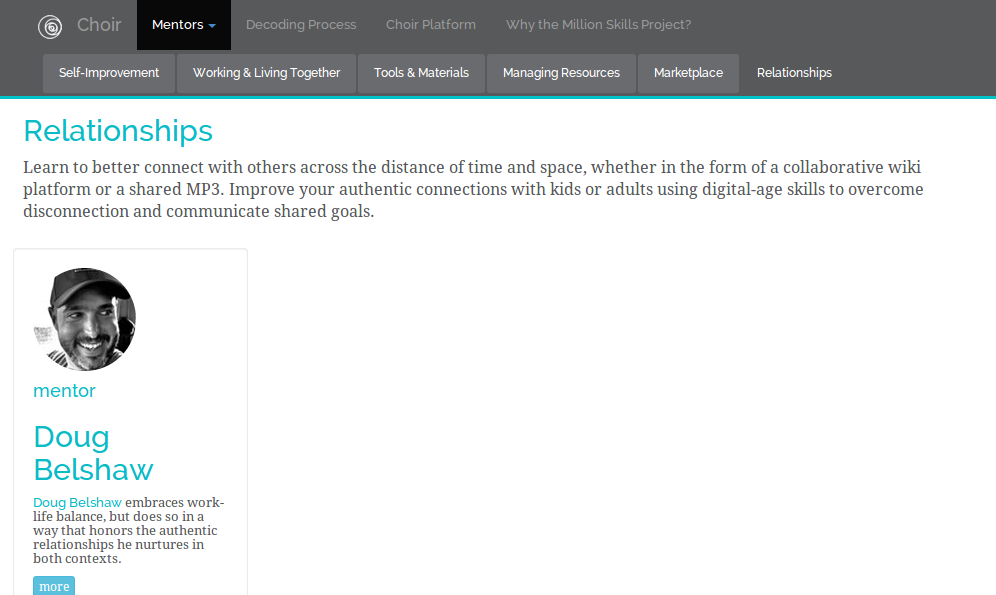Be More Doug
In the UK there’s an advertising campaign by O2 (part of the Telefonica group) encouraging us all to Be More Dog. In this post, I’m going to show you how to Be More Doug. It’s a fun way to reflect on the #MillionSkills interview I had with Christian Briggs and David Pace earlier this week based on the Decoding the Discplines process. You can see the website the team are building after their successful Kickstarter campaign here: http://bemorelike.com
The wide-ranging and, at times, challenging interview was conducted by Skype. Out of it came the following 10 points (which will be edited down to discrete chunks of video in the coming weeks):
- Crow’s nest scanning
- Vocation
- Surfing the zeitgeist
- Sharing
- Energy levels
- Enlarged version of self
- Doing work on behalf of others
- Prioritization
- Openness to outside influences
- Percolation
More Obvious
Four of the terms in this list refer to things that are more obvious than the remaining six. In order to avoid this becoming an epic post, I’ll run through the former quickly.
By vocation I’m rejecting the idea of ‘work/life balance’ as an artefact of the Industrial Revolution. Christian mentioned the term Gutenberg Parenthesis which is a convenient term to use here.
Energy levels is another pretty obvious one and cultivated by the holy trinity of sleep, exercise and diet.
We talked a lot about ‘over-sharing’ before I refined this to ‘appropriate sharing’ and finally just sharing. It’s particularly important for remote workers who are part of distributed teams to let other people know what they’re working on and any blockers they have. The more open and transparent you can be here, the better.
Prioritization is an interesting one and something I honed during my time as a classroom teacher. When you’re in an environment where there’s never enough time to do everything, then perfect is the enemy of good. I’m a big believer that success lies in knowing what to pay attention to.
Less Obvious
There’s a scene in the film I Capture the Castle (2003) where the main protagonist goes to see her father, a writer, in action. He’s covered the walls of his garret with pages and pages of his work. When she asks what they are, he says that they’re “perculating”. I see perculation as an extremely important part of my working life. I’ve realised that that I don’t have to finish everything in one go, that going for a walk or ‘sleeping’ on something works wonders, and getting feedback on half-finished things can extremely useful.
Linked to this is doing work on behalf of others. By this I don’t mean taking on their responsibilities. Instead, I mean packaging things up in such a way that makes them accessible to your audience. Too often we presume our audience – whether our colleagues or further afield – groks our context instantly. Because something is important and familiar to us we assume it’s the same for others. (I’ve just given you an example of how easy it can be do provide context on the web by hyperlinking the word ‘grok’ just now.)
I remember years ago reading something Iris Murdoch wrote somewhere about never having a strong sense of self. I’ve thought about that often since then and whether or not I do. Either way, the important thing in digital interactions is to be an enlarged version of self. It’s some advice that was given to me during teacher training and has stuck with me since. Present yourself holistically, but be selective in what you portray. Be positive and, as my Mozilla colleagues are great at doing, say “yes, and…” a lot.
The last two things I mentioned during the interview are closely linked: crow’s nest scanning and openness to outside influences. What they have in common is looking beyond the here and now to think about what’s happening elsewhere and what could happen in the future. Again, it’s about what you should pay attention to. In terms of scanning, it’s about trends and thinking through what would happen if X and Y and Z converged. There’s plenty of tools that help do this so the problem becomes one of conservation of attention – knowing when to go deep and rabbithole, and knowing when to zoom back out.
In terms of outside influences, it’s good to read and interact with people outside one’s field. This is something I personally could do much better at. I find that every time I do this I end up with new insights to apply to my domain. This, along with the knowledge of your section allows you to surf the zeitgeist. I’ve written a whole paper on ambiguity, but suffice to say that human communication is fraught with difficulties. If you can find terms that resonate and convey meaning quickly, then use those. They often allow new thought structures to be built within communities. This works even if you don’t like the term itself – for example, I use the term ‘Personal Learning Network’ even though I find it a bit irritating.
Conclusion
I found this process extremely useful as an insight something I don’t really discuss often. I’d like to thank Christian and David for the invitation and sitting through over an hour of me holding forth.
Want to share your workflow and insights? The decoding process is really useful, but I think that choosing a topic and getting someone to ask you ‘why?’ a lot could also yield results that I’d love to read. Who’s up for sharing next?




